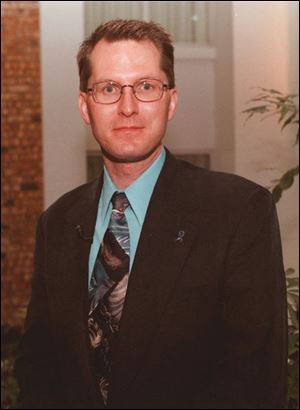
Story of abuse, recovery has touched the world
10/14/2000Watching and listening to Dave Pelzer, the entertainer, it was difficult to believe it was the same Dave Pelzer, the abused child. Is this the same person whose mother forced him to drink ammonia and who had to steal food to stay alive?
His miraculous transition from tortured child to successful, happy adult is mind-boggling.

Dave Pelzer: miraculous transition from tortured child to happy, successful adult.
Dave comes close to comedian status on stage as he turns a serious audience of 1,000 people into hearty laughter with his impersonations of Arnold Schwarzenegger and President Clinton. His warm, friendly talk skirts his incredible childhood until he is asked directly from the audience about the years of his mother's cruelty that he bares so descriptively in his best-selling book, A Child Called It.
Then he says things like, “I wasn't allowed to talk for 12 years and now I talk to large audiences all over the world.” He is recognized nationally as one of the most effective speakers to corporate groups and human service professionals.
“When I was forced to sit for hours on the basement stairs and not allowed to talk, I dreamed I could fly away,” he said. Years later, that dream came true.. As a young adult he joined the U.S. Air Force and became a flight fueling boom operator, serving in Operation Desert Storm.
As the keynote speaker at a recent Maui writers conference, his message was basically inspirational to hopeful authors. But how many writers have a life story to tell as he does in not just the first book that revealed the horrors of child abuse, but in two subsequent books, The Lost Boy and A Man Called Dave?
“For the record, I hate to write,” he said. “It takes 4 to 41/2 hours to jell one paragraph.” That's quite an admission from someone who has climbed to the top of the New York Times best-seller list with three books simultaneously and received commendations from presidents Reagan, Bush, and Clinton.
His advice to writers was simple and straightforward.
“At the end of the day, look at your book and, hopefully, you will have made a difference in someone's life,” he said. He has been untiring in his work to educate Americans about child abuse.
Thanks, Dave, for the advice, but the lesson I brought home from your talk was learning to forgive anybody for anything.
Long before I heard him speak, I had read his book with bated breath. I turned each page that outlined in detail a boy's brutal daily treatment by an alcoholic mother, hoping the next page would relate a ray of sunshine in this child's life. But no, the tales of abuse continue almost to the very end of the book, when he was rescued by teachers and a principal who finally woke up to his plight and arranged to place him in a foster home.
One has to wonder where they were looking all of the years that Dave went to school in rags with bruises all over his body, and why he became a thief, stealing morsels from other students' lunch pails. This was a boy whose mother broke his arm, stabbed him in the stomach, which he swears was accidental; gave him scraps of food the dogs refused, made him lie in cold water for hours, and kicked and beat him unmercifully.
A household slave who slept on an army cot in the basement without heat, who was ordered to sit on his hands on the stairs with his head thrust backward, POW style, as he listened to his brothers and parents eat and talk around the dinner table. It makes you wonder what child abuse may exist in our own neighborhoods.
What about the brothers, why didn't they tell someone what was going on? And, what about the father who witnessed the cruelty? The neighbors?
Dave writes that there were times when he wished he would die rather than suffer through another day of torturous treatment. He believes that if school personnel had not come to their senses and taken steps to place him in a foster home when he was 12 and weighed 68 pounds, his mother eventually would have killed him in one of the hateful games she played.
Instead, joyfully, to the thousands who have come to know the courageous, self-reliant Dave through his books, speeches, and child abuse crusade, he survived.
The real Dave comes out not in an entire book, but in one sentence.
“I forgive my mother,” he told the audience.
“I interviewed her before she died a year before the first book was published,” he said. He reasons that she was sick and turned to drink to escape.
That, to say the least, is a mark of character. No matter how deep a religious vein runs through you, how many lessons you have learned in Sunday School about forgiveness, could you forgive someone who made you a bruised, beaten prisoner in your own home for years? Especially if that person was your own mother?
It will be easier to make that call next May when a movie based on Dave's story is released. In the meantime, I enjoy thinking of Dave living happily ever after with a wife he adores and a 14-year-old son, Stephen, at Guerneville, on the Russian River in northern California.
He says Stephen is his friend - and a normal teenager. “Last week he wanted to be a Marine and this week he wants to be a marine biologist,” the proud father said.
Mary Alice Powell is a former Blade food editor.